Incandescence Read online
Page 2
«Hunt it down how?» Csi asked bluntly.
«They recorded the meteor's velocity when they captured it,» Lahl said. «And they provided me with detailed maps of the region. I couldn't literally wind all the dynamics back fifty million years; the region is so densely packed with stars that their motion becomes chaotic on that time scale. But it was possible to generate candidates for closer exploration.»
«How many?» Csi demanded.
«About six hundred.»
Csi groaned and leaned backward on the bench, as if to extract himself from the gathering. «This is insane!»
Rakesh could not deny that, but it was an increasingly enticing folly. Uncharted or not, the center of the galaxy was an exotic, bejewelled place, and if its self-appointed guardians really were inviting outsiders in for the first time ever, that alone was a remarkable opportunity. If the reason for the invitation turned out to be a wild goose chase, or even a complete misunderstanding, that need not render the voyage worthless; it was impossible to rule out danger and disappointment, but at the very least he'd be risking much less than the galaxy-hoppers. How many millennia might he while away before another prospect the equal of this came along?
He said, «I'll take the address.» He glanced at Parantham. «I assume I'm not required to go alone?»
Lahl said, «Take an entourage. Take a caravan.» She held out her hand, the fist closed, then opened her fingers to reveal a glass key sitting on her palm, an icon for all the data she wished to convey to him. As Rakesh reached for it, she said sharply, «This is your duty now. Your burden. You do understand that?»
He hesitated. «What exactly are you asking me to promise? I can't be certain that I'll find this planet.»
«Of course not.» Lahl frowned, perhaps wondering what distortions her perfectly lucid chemical emanations were suffering in translation. «Succeed or fail, though, you'll see it through?»
Rakesh nodded gravely, reluctant to press her for details lest they transform this reasonable-sounding commitment into some far more rigorous obligation.
He took the key from her, and she stood.
«Farewell then, Rakesh.» The scape drew her as almost literally unburdened, her bearing visibly more relaxed and graceful, as if she'd been freed of a physical load.
The four friends rose. As Lahl walked away across the mesa, Rakesh peeked at her version of the scape. A long, translucent, segmented creature pushed its way briskly through a dense carpet of decaying vegetable matter, beneath an overcast sky.
Csi called after her, «Enjoy the reunion!»
Rakesh restored his normal vision and looked around the table. Parantham was jealously eyeing the key in his hand.
Viya smiled. «You're not really going to do this?» She sounded as if she'd be unsurprised if he shook his head and casually pitched the key over the edge of the mesa.
«Of course I am,» Rakesh replied. «I gave my word.»
«To whom, exactly?» Csi asked. «For all you know, she was just some de novo that the Aloof created and spat out as bait.»
«Bait? If they wanted visitors, all they had to do was stop turning us away. We never needed luring.»
«We never would have gone in this way by choice,» Csi said. «With no guarantee of integrity. Once you're in, they can send you wherever they like, and do whatever they want with you.»
Rakesh said, «Why would they want to harm me? Anyway, people taking the short cut have been checked, and there have never been any violations found.»
«What proportion have been checked?» Viya asked. «One in a thousand? And the data passing through the network is classical, remember. Even if the original transmission comes through intact, that doesn't prove it hasn't been copied. If you go in without encryption, there'll be nothing they can't do to you.»
«All right, it's a risk, I admit it. The Aloof might be deranged sadists who clone travelers in order to torture them for eternity.» Rakesh was disappointed. He had no shortage of doubts about the wisdom of his decision, but he'd expected more from Viya and Csi than this timidity masquerading as sophistication.
None of them had come to the node with the intention of staying for a tenth as long as they had. Half their time was spent debating the best way to move on, inventing one fanciful scheme after another, hunting for ways to build up momentum lest they end up stranded, or worse: slinking back to their home worlds with nothing to show for the millennia, or simply drifting aimlessly on through the network.
He held up the key. «This is what I came here for. I'm not going to sit at this table for another century, waiting for something better.»
Csi adopted a conciliatory tone. «We all get bored, Rakesh. We all get frustrated. But that's no reason to fall for the first scam artist who comes along.»
Parantham said, «If it's a prank, what happens? We cross the bulge, the Aloof ignore us, and we end up on the other side of the galaxy. We lose fifty millennia, but we gain new surroundings, and the minor daredevil status that comes from having taken the short cut.»
«And if it's a trap?» Viya asked. «If the Aloof really do mean you harm?»
Parantham hesitated before replying; Rakesh waited gleefully to hear her pour scorn on the idea.
She said, «That's what backups are for.»
2
As the work party dispersed, Roi headed for the nearest tunnel. The warm buzz of cooperation was fading, giving way to a faint sense of melancholy, and she needed to get away from the wind and the weight to a place where she could rest.
She'd lost count of the number of shifts she'd spent with this team, tending the crops at the garm-sharq edge of the Splinter. It was important work, killing the mites and weeds, keeping the crucial reservoir of food healthy and abundant. If the edible plants prospered here, where the hot, fertile wind blew in from the Incandescence, the seeds that ended up scattered throughout the garmside would give rise to enough secondary growth to feed everyone. If that ceased to happen and people were driven by hunger to feed on the reservoir itself, the initial shortfall could spiral out of control. Roi was too young to have lived through a famine, but some of her fellow workers had survived two or three. The visceral sense of satisfaction that came from acting in unison was enough to keep her working at almost any task, but this one easily stood up to the scrutiny of conscious reflection.
The tunnel dipped and weaved erratically as it wound its way up. The wind was strong but steady, a nuisance but no great complication. Away from the well-trodden path that marked the easiest ascent, a riot of vegetation colored the light of the underlying rock. Roi resisted the urge to reach out and crush the inedible varieties; most of them had their uses, and as long as they didn't crowd out the food crops they deserved to be left to grow in peace. It was a familiar part of the winding down process to be aware of the weeds everywhere, without responding to the sight of them in the manner that was second nature when she was working.
The tunnel ended in a crowded chamber, where six routes leading up from the garmside edge converged. People were coming up out of the wind after finishing a variety of tasks, and while there was no need for most of these shifts to be synchronized, some kind of social cue seemed to have nudged the timing into a rather inconvenient lockstep. Roi recognized a few members of her own team crossing the chamber, but felt no desire to rejoin them.
At the edge of the flow of bodies a group of wretched males clung to the rock, begging to be relieved of their ripeness. Roi approached them to inspect their offerings. Each male had separated the two hard plates that met along the side of his body, to expose a long, soft cavity where five or six swollen globes sat dangling from heavy cords. Not all of the seed packets were plump and healthy, but Roi made a conscious effort not to be too finicky. With her own carapace split open along her left side, she used her mating claw to reach into the males' bodies, snip the globes free, and deposit them inside herself.
She stripped all the packets from the first three donors, and they shuddered with gratitude and disappeared into th
e crowd. When she took two globes from the fourth male and found that she was full, she muttered a few consoling words and left him wailing for further assistance.
The ripe seed packets secreted a substance that the males found extremely unpleasant, and while unplucked globes did shrivel up and die eventually, waiting for that to happen could be an ordeal. There were tools available for severing and discarding them, but that method was notoriously prone to spilling an agonizing dose of irritant. Something about a female's mating claw — something harder to mimic than its shape and its mechanical action — sealed the broken cord far more effectively than any tool.
As Roi continued across the chamber, a pleasant haze of contentment washed over her. The seed packets were battling for supremacy, but the poisons they were using against each other had a thoroughly positive effect on her. The battle was rendered more intense by a weapon of her own: a small quantity of crushed plant material that she replenished regularly. All of her competing suitors would die, valiantly trying to out-poison this thoroughly sterile rival.
Roi left the chamber by the least crowded route, intent now on finding a quiet crevice in which to recuperate. The wind would never fall completely silent unless she traveled all the way to the narrow calm space that divided the garmside from the sardside, but it wouldn't take long to reach some veins of less porous rock that offered a degree of shelter. There was no shelter from the geographical certainties of weight, but after so long working at the Splinter's edge she didn't need much lightening in order to feel unburdened.
Ahead of her, a lone male stood idle in the middle of the tunnel. He wasn't begging for help, and as she drew closer Roi could see that he carried no seeds. A moment later she recognized something else in his appearance: the visibly laboring heart of someone who'd ventured well beyond the weight he was accustomed to bearing.
The male was blocking the easiest way ahead, so Roi, undeterred by the weeds, climbed the tunnel wall to detour around him.
«It must be something simple,» he declared.
Roi paused courteously. «What must be, father?»
«Whatever underlies it all.»
«Of course.» Roi had no idea what he was talking about, so she could hardly dispute him.
She hesitated, then started to move on.
The male scrambled after her. «My name is Zak.»
«My name is Roi.» He was exerting himself valiantly to match her pace, but she took pity on him and slowed down a little. «I work among the crops, at the garm-sharq edge.»
Zak chirped approval. «Valuable work.»
Roi glanced behind them. If this was some kind of recruitment ambush, his team-mates were well hidden. «What do you do?»
«I doubt you will have heard of my task. In fact, lately I've been working alone.»
Roi didn't ask why he remained unrecruited; he was plainly quite old, and probably in poor health. Being stranded without team-mates was an unfortunate fate for anyone, but she had no power to change that for him. She certainly couldn't recruit him into her own team, in his condition.
«I spend a lot of time in the Calm,» Zak continued. «Near the Null Line.»
«I see.» Resting, hoping to recover from an illness? Or perhaps being weightless too long was the cause of his weakness. «Doing what?»
«Playing with some contraptions of mine. Trying to find something simple.»
«I don't understand. What is it you're looking for?»
Zak said, «I'm not sure. But I'll recognize it when I see it.»
They continued on in silence for a while. Roi didn't mind him accompanying her; he could hardly hijack her loyalty on his own, and she was relieved to see him heading for a level more conducive to his health.
«Do you ever wonder why we climb up to the Null Line from the garm and sard quarters,» Zak asked, «but down to it from the shomal and junub?»
«What is there to ponder?» Roi replied, amused. «That's just the way it is.» When Zak said nothing she added defensively, «Do you really think it's surprising? Any point you name must be above some places, and below others. So why shouldn't the four quarters be half and half?»
Zak said, «If you ascend to any other point and then continue on in the same direction, you cross between the two alternatives: the point that was originally above you is now below you. When you cross straight through the Null Line, that doesn't happen. If you go from garm to sard, the Null Line remains above you. If you go from shomal to junub, it remains below.»
Roi was tired, but she forced herself to concentrate. She might have let the matter drop for the sake of harmony, but something about Zak provoked her to disputation.
«At the Null Line you have no weight,» she said finally, «so there really is no up or down. That's the difference. If any other point stayed above you as you crossed through it, your weight would have to reverse suddenly, changing completely in a single step. At the Null Line it shrinks to nothing, so a change in direction is no change at all.»
«Exactly.» Her answer was clearly no revelation to Zak, but he sounded pleased that she'd made the effort to think it through. «That still doesn't explain the particular pattern, though. I can see no logical difficulty with a far simpler situation: our weight always pointing away from the Null Line, or always pointing toward it. Nor can I see any barrier to more complex arrangements. Why the four quarters? When you circle around the Null Line, why should it be above you, then below you, then above, then below? Why not six changes of direction, or thirty-six?»
Roi rasped annoyance. «And if it was thirty-six, you'd be asking why not four, or six.»
«Of course I would. But I don't believe it could ever be thirty-six.»
«You just told me you can see no reason why it shouldn't be!»
Zak said, «I can't see the reason yet. But four is small enough to point to something simple. If it was thirty, I could believe it might be thirty-six. Because it's four, though, I believe it must be four.»
They'd reached a junction in the tunnel. Roi moved toward the left branch, which she knew was a cul-de-sac ending in some comfortable crannies.
«Before we part,» Zak said, «can I show you something?» He opened his carapace and reached into the empty seed bed to remove a rolled-up sheet of cured skin, which he proceeded to spread out before her. «This is my favorite map of the Splinter.»
Roi was unimpressed. The single cross-section portrayed was covered with an absurdly regular hatching of short, straight lines which bore no resemblance to any routes she knew. And there was no hint of anything really useful, such as vegetation patterns or the lodes of dense, sheltering rock.
«Are you telling me I can get from here to here?» she asked, gesturing at two endpoints of one of the peculiar markings. But it wasn't even clear where these points were meant to be, since there were no cues to indicate how far along the Null Line, rarb or sharq, the cross-section was taken.
«It's not a map of tunnels,» Zak replied. «It's a map of weights.»
It took a moment for his meaning to become clear. The longest lines were drawn at the edge of the Splinter, where the weight was greatest. The lines' varying lengths, and the way they gradually rotated as you followed them around the center of the map, offered a plausible rendering of the way weight changed from place to place. A small crossbar on each one distinguished the bottom end from the top.
«You drew this yourself?» she asked.
«No, I copied it from a map I found in a library. That had nothing to indicate its provenance, though, and it could easily have been a copy itself. For all I know this could be the seventh or eighth generation.»
Roi pondered the strange task the original cartographer had embarked upon. «Everybody knows that weight increases as you move away from the Null Line. What's the need for a map like this?»
«In what manner does it increase?» Zak demanded. «How quickly, as you move in different directions? And which way, exactly, is down, as you move between the quarters?»
Roi couldn't imagine why a
nyone would need to know these things with more precision than she already knew them herself. Still, there was something compelling about the stretching and shrinking and rolling of the lines. Each individual mark conveyed nothing new to her, but seeing the totality displayed in this way was curiously satisfying.
«It's pleasing to the eye,» she conceded. «Like the pattern of seeds on a leaf.»
«Oh, it's far simpler than that,» Zak replied. «I can characterize it very easily. Suppose you travel three hundred spans shomal or junub from the Null Line. The weight there will be one vazn, back toward the Null Line. If you travel twice as far, the weight will be two vazn; three times as far, three vazn; and so on, in proportion to the distance.»
«If you travel garm or sard instead, your weight will point away from the Null Line, and it will grow three times as fast. You only need to go one hundred spans before it reaches one vazn.»
«What if you travel in none of those directions?» Roi gestured at the map. «The weight twists around. It's no longer so simple.»
«It remains simple,» Zak insisted, «if you know one more trick. Think of weight as a line, as it is on this map. Put aside for a moment the length and direction of that line, and ask instead for its extent along two axes: shomal-junub, and garm-sard. However far you are shomal or junub of the Null Line determines the weight line's extent along the shomal-junub axis. However far you are garm or sard determines its extent along the garm-sard axis. That's all you need to know in order to draw the line. Its extent in each direction has a simple prescription, and that fixes the line as a whole.»
Roi absorbed this, then re-examined the map, which seemed to bear out Zak's claim. But if his recipe for combining the effect of travel in different directions seemed simple enough to be inevitable, it was the basic ingredients that now struck her as puzzling. Why did being garm or sard of the Null Line add three times more to your weight than being shomal or junub? Why not four times, or five? And why did «garm-sard weight» push you away from the Null Line, while «shomal-junub weight» pulled you back to it? She couldn't even guess at the answers, but she could understand now why Zak was pursuing this strange, lonely task. These patterns demanded an explanation.

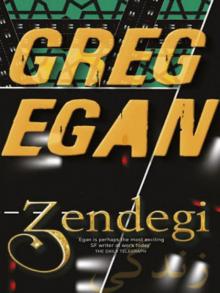 Zendegi
Zendegi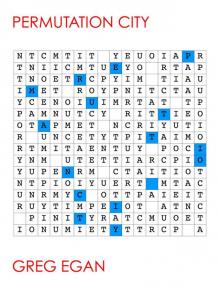 Permutation City
Permutation City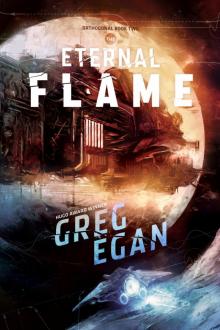 The Eternal Flame
The Eternal Flame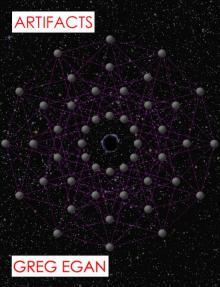 Artifacts
Artifacts Wang's Carpets
Wang's Carpets Dichronauts
Dichronauts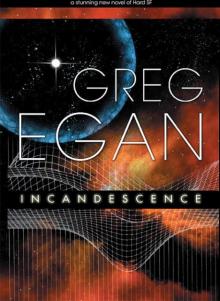 Incandescence
Incandescence Teranesia
Teranesia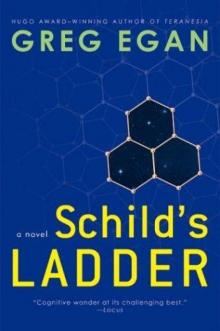 Schild's Ladder
Schild's Ladder Quarantine
Quarantine The Four Thousand, the Eight Hundred
The Four Thousand, the Eight Hundred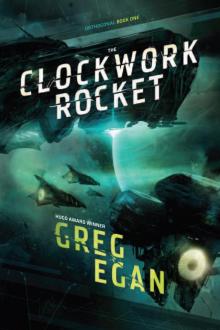 The Clockwork Rocket
The Clockwork Rocket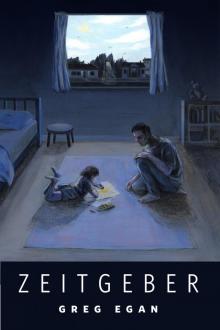 Zeitgeber
Zeitgeber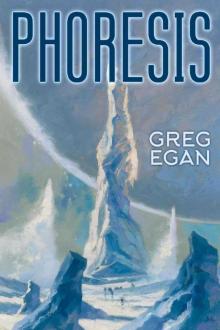 Phoresis
Phoresis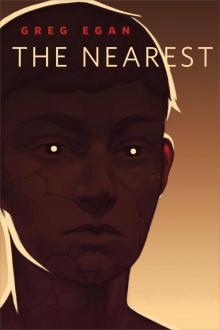 The Nearest
The Nearest Diaspora
Diaspora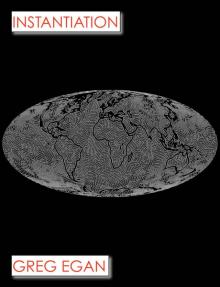 Instantiation
Instantiation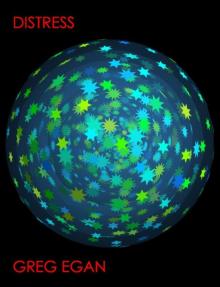 Distress
Distress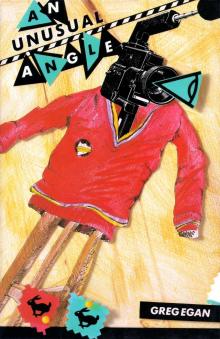 An Unusual Angle
An Unusual Angle Oceanic
Oceanic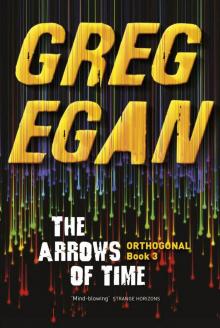 The Arrows of Time
The Arrows of Time Axiomatic
Axiomatic![Anthology 2. Luminous [1998, 2010] Read online](http://i1.bookreadfree.com/i/03/18/anthology_2_luminous_1998_2010_preview.jpg) Anthology 2. Luminous [1998, 2010]
Anthology 2. Luminous [1998, 2010]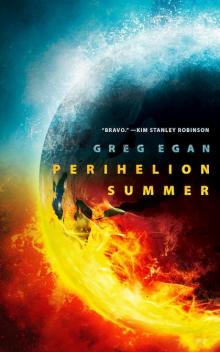 Perihelion Summer
Perihelion Summer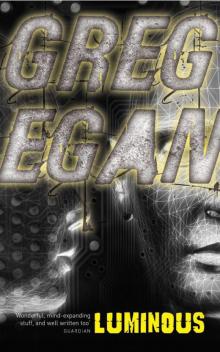 Luminous
Luminous